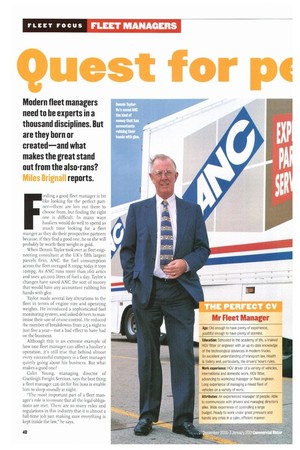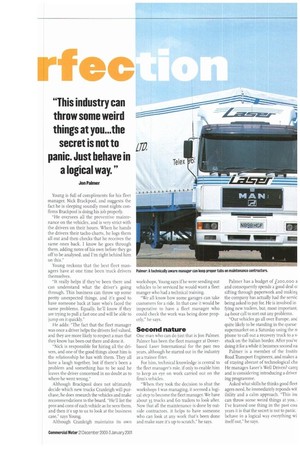OU0St fekr
Page 42

Page 43

If you've noticed an error in this article please click here to report it so we can fix it.
Modern fleet managers need to be experts in a thousand disciplines. But are they born or created—and what makes the great stand out from the also-rans?
moPs Bi reports.
IFinding a good fleet manager is bit like looking for the perfect partner—there are lots out there to choose from, but finding the right one is difficult. In many ways hauliers would do well to spend as much time looking for a fleet manger as they do their prospective partners because, i f they find a good one, he or she will probably be worth their weight in gold.
When Dennis Taylor took over as fleet engineering consultant at the UK's fifth largest parcels firm, ANC, the fuel consumption across the fleet averaged 8.1mpg; today it tops rompg. As ANC runs more than 16o artics and uses 40,000 litres of fuel a day, Taylor's changes have saved ANC the sort of money that would have any accountant rubbing his hands with glee.
Taylor made several key alterations to the fleet in terms of engine size and operating weights. He introduced a sophisticated fuel monitoring system, and asked drivers to maximise their use of cruise control. He reduced the number of breakdowns from 2.5 a night to just five a year—not a bad effect to have had on the business.
Although this is an extreme example of how one fleet manager can affect a haulier's operation, it's still true that behind almost every successful company is a fleet manager quietly going about his business. But what makes a good one?
Colin Young, managing director of Cranleigh Freight Services, says the best thing a fleet manager can do for his boss is enable him to sleep soundly at night.
"The most important part of a fleet manager's role is to ensure that all the legal obligations are met. There are so many rules and regulations in this industry that it is almost a full-time job just making sure everything is kept inside the law," he says.
Young is full of compliments for his fleet manager, Nick Brackpool, and suggests the fact he is sleeping soundly most nights confirms Brackpool is doing his job properly.
"He oversees all the preventive rnaintenance on the vehides, and is very strict with the drivers on their hours. When he hands the drivers their tacho charts, he logs them all out and then checks that he receives the same ones back. I know he goes through them, adding notes of his own before they go off to be analysed, and I'm right behind him on this."
Young reckons that the best fleet managers have at one time been truck drivers themselves.
It really helps if they've been there and can understand what the driver's going through. This business can throw up some pretty unexpected things, and it's good to have someone back at base who's faced the same problems. Equally, he'll know if they are trying to pull a fast one and will be able to jump on it quickly."
He adds: "The fact that the fleet manager was once a driver helps the drivers feel valued, and they are more likely to respect a man that they know has been out there and done it.
"Nick is responsible for hiring all the drivers, and one of the good things about him is the relationship he has with them, They all have a laugh together, but if there's been a problem and something has to be said he leaves the driver concerned in no doubt as to where he went wrong."
Although Brackpool does not ultimately decide which new trucks Cranleigh will purchase, he does research the vehicles and make recommendations to the board. "He'll list the pros and cons ofeach vehicle as he sees them, and then it's up to us to look at the business case," says Young.
Although Cranleigh maintains its own workshops, Young says if he were sending out vehicles to he serviced he would want a fleet manger who had a technical training.
"We all know how some garages can take customers for a ride. In that ease it would be imperative to have a fleet manager who could check the work was being done properly," he says.
Second nature
One man who can do just that is Jon Palmer. Palmer has been the fleet manager at Doverbased laser International for the past two years, although he started out in the industry as a trainee fitter.
For him, technical knowledge is central to the fleet manager's role, if only to enable him to keep an eye on work carried out on the firm's vehicles.
"When they took the decision to shut the workshops I was managing, it seemed a logical step to become the fleet manager. We have about 35 trucks and 6o trailers to look after. Now that all the maintenance is done by outside contractors, it helps to have someone who can look at any work that's been done and make sure it's up to scratch," he says.
Palmer has a budget of £200,000 a and consequently spends a good deal o1 sifting through paperwork and makinf the company has actually had the servic being asked to pay for. He is involved in fying new trailers, but, most important 24-hour call to sort out any problems.
"Our vehicles go all over Europe, an quite likely to be standing in the queue supermarket on a Saturday using the n phone to call out a recovery truck to a v. stuck on the Italian border. After you've doing it for a while it becomes second na Palmer is a member of the Institt Road Transport Engineers, and makes a of staying abreast of technological cha He manages Laser's Well Driven? camj and is considering introducing a driver ing programme.
Asked what skills he thinks good fleet agers need, he immediately reponds wit ibility and a calm approach. "This im can throw some weird things at you, I've learned one thing in the past cou years it is that the secret is not to panic. behave in a logical way everything wi itself out," he says.








































































































































